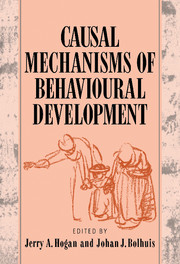Book contents
Foreword: Introducing Jaap Kruijt
Published online by Cambridge University Press: 19 January 2010
Summary
Unravelling the causal processes through which species-characteristic behaviour develops in the individual is one of the most important issues of ethology. This analysis is not only of purely theoretical interest, but has an applied value as well in the prevention and cure of behavioural disturbances. Jaap Kruijt's retirement at the end of the academic year 1992/93 concludes a period of almost 40 years in which he devoted himself to developing this branch of ethology within the framework of the Zoological Laboratory of the University at Groningen (The Netherlands). By focusing his research on relatively complex social behaviour and by strongly opposing the dichotomous classification of behaviour into innate and learned, Kruijt has rendered an internationally unique contribution to the study of behavioural development. This makes it worthwhile to dwell briefly upon some phases of his own ontogeny.
Jakob Pieter Kruijt was born in Amsterdam in 1928. In his boyhood he developed a strong interest in wildlife, influenced – like many of us – by the writings of two Dutch naturalists, E. Heimans and Jac. P. Thijsse, and also by participating in the activities of the Dutch Youth Association for Nature Study. This interest made him ripe for the study of biology, which he started in 1946 at the University of Utrecht. At that time zoological research in Utrecht was mainly concerned with laboratory work; comparative and developmental physiology were strongly represented.
- Type
- Chapter
- Information
- Causal Mechanisms of Behavioural Development , pp. xi - xviiiPublisher: Cambridge University PressPrint publication year: 1994



